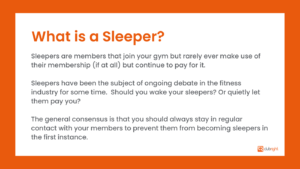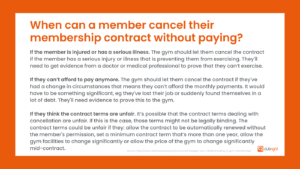Historically, it was normal to be tied into a contract when you join a gym. It was one of the things a customer would have to agree to in exchange for working out at your club.
However, with the cost of living rising and consumer priorities changing, is it wise to still be selling and enforcing contracts for your gym?
More importantly, could doing so be negatively impacting sales?

Is it really good business sense?
Signing your customers up for contracts has always made good business sense. It helps you forecast income, adds weight to your business plan and keeps your investors happy because they can get a glimpse of their return.
However, tying your customers into a financial commitment doesn’t necessarily guarantee you stability. Just look at how easily the pandemic disrupted everything as we know it! If your customers are unsure of what their future holds (like many of us post-covid), they’ll likely be put off by a long-term financial commitment like a gym contract.
You should consider the possibility that you’ll be able to sign up more leads if you promise them flexibility and control over their memberships. In doing so, you’re dismantling the potential contract barrier – which means you can get them to start paying and focus your energy on retaining them.
Are contracts as effective as they seem?
Did you know consumers still have certain legal rights surrounding cancellations, even if they’re tied into a contract?
A customer that has joined your gym and entered a contract will normally have to pay the full cost of the contract if they want to cancel the membership early. For example, if they cancel a one-year contract after 6 months, they’ll usually have to pay for the remaining 6 months of the term.
Despite this, there are still a few occasions when your customer can cancel their membership without paying the remainder of their contract:
- If the customer is injured or has a serious illness
- If they can’t afford to pay any more
- If they think your contract terms are unfair (more info on what this means here)
Contracts can also mean very little because some gym contracts are Service Agreements, not consumer-regulated credit agreements like that of car finance or mobile phone fees in which case you’re receiving a tangible product.
Plus, if one of your members wishes to cancel mid-contract and go somewhere else, pursuing that legally can be both expensive for you and leads to bad PR if the local area catches wind of your club taking a customer to court. It’s much easier to give your members the freedom to come and go as they please under a flexible membership that suits their lifestyle and focus on retaining them through a fantastic workout experience and unrivalled customer service.
Take us at ClubRight for example. We don’t tie our users into a contract to use our system – gym owners stay with us because they love the functionality we offer them, not because they’re forced to!

Gone are the days of sleepers.
Sleepers are no longer an issue these days, especially post-pandemic. Redundancies, income uncertainty and the rising cost of living have made people more vigilant than ever when it comes to their monthly bills. They won’t hesitate to cancel a bill that they no longer see value in.
Your energy will be far better spent building an exceptional customer service strategy that retains your customers and makes them stay because they want to; because they see value in the service you offer.
Besides, having a large proportion of sleepers will end up costing you money in the long run. Any one of them (or all of them) could wake up tomorrow and cancel their membership, leaving you out of pocket.
Use referrals to your advantage.
Those long-standing, advocate members are walking advertisements for your business. Their friends and family will be asking them about their fitness journey, and your club will be one of the first things they mention.
So set up a robust referrals program in place of worrying about contracts so that you can reward those that get their friends to join your gym. In some ways, referred customers are more valuable than cold leads because they have real social proof to influence their buying decision. Referrals are also a great way to measure customer satisfaction: happier customers are more likely to tell their friends about your club.
ClubRight has automated communications as part of our complete solution to help you keep in touch with customers, so setting up that referral scheme brings no added work on your part.
In summary, contracts can impact sales at your club. It’s understandable why clubs are tempted to sell and enforce contracts, but nowadays people want control and flexibility. If your customers don’t feel like they have those key things, it can create a barrier for them before they’ve even joined.
Regardless of the memberships you offer, ClubRight can help you make sure they sell and retain those customers for longer. Learn how by speaking to one of our experts on +44 (0)203 884 9777 or book a free online demo today.







